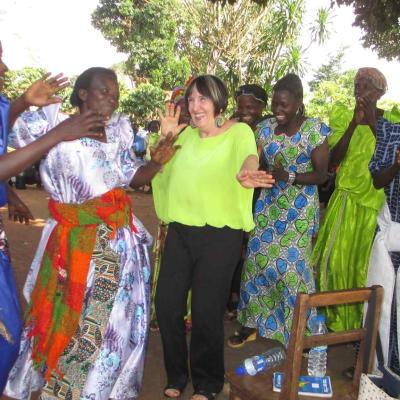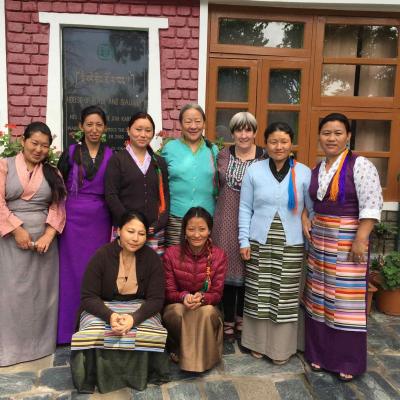Adaptive Options A Global Network of Change and Development Professionals and Practitioners. Volume 5, Issue 1 Spring 2010 , 13-18.
Copyright 2010 Dr. Jerry Glover
http://www.fm-kp.si/Files/Profesor/Gulev/AdaptiveOptionsSpring2010.pdf
Adapting to Change Is A Gender Issue
Sharon G. Mijares, Ph.D.
Global trade, the internet and travel have greatly expanded communication on all levels, for better and for worse. As evidenced by the environmental, economic, religious and political problems facing us, it is obvious that this expansion requires more harmonious human interactions—especially if it is to be a win-win endeavor. This article suggests that adaptive interaction requires a shift in gender balance in order to both promote and sustain needed economic and leadership changes. It provides research and examples related to women and their contributions to resolving current environmental, dietary, economic and political problems.
Considering the massive changes impacting us on every aspect of social organization it is necessary that the feminine half of humanity be included in all decisions and efforts to move in healthier directions. Gender is an important factor to include in any discussion on adaptation and options for change in the 21st century in order to both promote and sustain needed economic and leadership changes. The paradigm of one person, gender, company or nation profiting at the loss of another appears to be leading us into chaos. Therefore, balancing gender has the potential to impact every level of human life for the better. It can provide the energetic and relational field in which new ideas and creative change are birthed.
Seventy-two years ago, the late Eleanor Roosevelt (1884-1962) recognized the dilemmas confronting us. She clearly saw the emerging crises when she wrote,
Every nation is watching the others on its borders, analyzing its own needs and striving to attain its ends with little consideration for the needs of its neighbors. Few people are sitting down dispassionately to go over the whole situation in an attempt to determine what present conditions are, or how they should be met.i
In her book, This Troubled World (1938), Eleanor noted the value of women in promoting good relationships, the role of ethics, and, even more importantly (and bravely considering her prominent position), she noted the importance of a “love” that reached out beyond borders-caring for the entirety of humanity. She recognized that this motivation would enable economical, environmental, social and political behaviors that would benefit all people, other species and our planet. Eleanor believed, as do many others, that women have the potential to provide the qualities of what she called “brotherly love” as it has been absent in every facet of patriarchically- governed endeavors.
Perhaps the current crises will force us into a deeper form of caring for one another, and in this field—our innate human creativity will naturally emerge and provide new resources and ways for dealing with old problemsii. Certainly, human creativity and caring leadership are needed. Recently, when driving through the streets of San Diego and Alameda counties in California, I saw many empty buildings, locations that used to host a variety of differing businesses. It was easy to imagine the results of economic failure, the shattering of dreams and the impact of these losses on families—the suffering of so many people impacted by every vacant building. This is what Eleanor Roosevelt was talking about when she noted women’s capacity to include the impact on relationships in any relevant global discussion. Compassionate connectedness will allow for a more balanced and healthy adaptation to the paradigmatic changes occurring, as we move from the patriarchal organizational patterns that have dominated our world into a gender balanced model of human relationship. This means that equal representation of women is needed in all levels of social organization, including economic and political arenas.
In 1999, the World Bank published a Policy Research Report on Gender and
Development, a document investigating the differences between men and women in relationship to corruption in government. It was revealed that,
Numerous behavioral studies have found women to be more trust-worthy and publicspirited than men. These results suggest that women should be particularly effective in promoting honest government. Consistent with this hypothesis, we find that the greater the representation of women in parliament, the lower the level of corruption. We find this association in a large cross-section of countries; the result is robust to a wide range of specifications.iii
This doesn’t mean that women are incorruptible; as both genders have contributed to and are part of this dying patriarchal social organization—and both genders are also parts of the change. In their book, Women, Gender, and World Politics, Beckman and D’Amico discuss the biological differences existing between males and females, but also note that “gender characteristics are cultural creations, passed on to new members of a society [or religion] through a process called socialization.”iv Biological sex and gender are separate issues in regard to what constitutes a man or a woman, and these differ when comparing one culture with another. In their study, Beckman and D’Amico also included the obvious variations in each sex. For example, one male can be totally focused on power over others whereas another may lack the strength needed for leadership, but exhibit nurturing qualities (both are needed). The female could manifest total reliance on others for decision-making or evidence combative characteristics, or at a more developed level emanate both strength and concern for others. But, on the whole, patriarchal ideologies influencing political, economic policies, religious dogmas and cultural practices have assured that rigid gender models be maintained—and have thus hampered the wellbeing of many of our institutions.
Because of this, women have, by necessity, adapted to the male-dominated environment, repressing signs and feelings related to innate femininity, in order to obtain any level of success within it. Many women utilized masculine behaviors as it appeared to be the only way a woman could obtain a status of power in a chosen profession. This has been detrimental as it added to this energetic imbalance, and will no longer provide long term strategies for success. Given the current economical and environmental crises, it is relevant to recognize that overall, women do not respond to stressors in the same manner as males. This is especially relevant if economic, environmental and political stressors lead to chaotic conditions. In our book, The Root of All Evil: An Exposition of Prejudice, Fundamentalism and Gender Imbalance,v we included a discussion of hormonal differences between males and females in regard to testosterone and oxytocin levels to support our theory that patriarchal ideology and the lack of gender balance was at the root of our current plight. Testosterone is more associated with fight vs. flight responses, and oxytocin with care-taking ones. In that evolutionary and environmental patterning have encouraged increased testosterone in males, and oxytocin in females, increasing the numbers of women in all threatened human endeavors provides the balance needed for new ways to deal with old problems. The unique qualities of the feminine can stir the pot, shift the direction of the stream, and create positive changes—the ones being discussed throughout this journal edition. Once the role and power of gender is fully understood, and included as a primary element of the global discourse, we will discontinue this practice of repeating and recreating the same problematic scenarios.
As an experiment turn on any news channel covering current governmental decisions regarding health care and/or proposed and attempted resolutions of economic problems and you will notice that the majority of “decision-makers” are males. Listen and watch the decisions being made regarding ongoing wars and discussions on nuclear weapons and you will see the evidence of disproportionate gender imbalance. These same examples apply when considering the dangerous neglect of current environmental threats. Obviously, the current paradigm is doing little, if anything, to help the problem. One woman, the 2004 Nobel Peace laureate Wangari Maathai, initiated the Green Belt Movement in 1977 as one means of providing sustenance and income for the people of Kenya. First, she enlisted groups of women to grow and plant trees on farms. They also gave seedlings to nearby farmers, and assured the farmers followed through on the project. This also provided a monetary reward in that,
They received 1 shilling for each exotic tree they distributed and 2 shillings for indigenous/fruit trees as a token of appreciation for the work they were doing. By 1997, over 20 million trees had been planted and survived. This was seen both as a significant contribution to environmental conservation worldwide and a contribution to improving livelihoods; the trees provided income (through sale of timber, firewood, fodder, fruits), food (fruits), improved food productivity (because of improved soils), building materials, fencing materials, fencing materials and many other life benefits.
Their website notes that “The mission of the Green Belt Movement International (GBMI) is to empower communities worldwide to protect the environment and to promote good governance and cultures of peace.”[1]
Twenty-seven years ago a Japanese woman, Yumiko Otani, was thinking about diet and the fact that it cost considerable money and care to support the meat industry. She began thinking about the Shinto goddess, Ama-terasu Omikami,who was the embodiment and radiating force of the sun, nourishing the life force of all. This led to Yumiko’s theory that it is far healthier to eat the natural grains of the earth. Although her education has been in engineering, her creative insight and caring led her in a new direction. By 1996, she had published Miraishoku [Future Food]: Surviving the Age of Environmental Pollution, and started the Life Seed Campaign under the concept of “changing kitchens and farmland to enrich the Japanese diet with native grains”, and began organizing Tubu-Tubu Peace Food Seminars to teach her theories and skills with regard to foods that can revitalize the body. In 2000, she began introducing her concepts to international audiences, and by 2004 Tubu-Tubu Peace Foods were introduced at “Terra Madre”, a slow-food conference of 5,000 producers. She has also gone out of her way to hire and train women as one way of shifting the gender imbalance in Japan.vi
Gender inequality hinders development in business and economic realms. In fact, it has an impact upon “the rest of society and impedes [overall] development.”vii Thus this rigorous movement towards gender equality is spreading around the globe. Entrepreneur Margaret Heffernan is considered to be a business guru. In an interview with the BBC, she noted that corporate ways of dealing with the war as industry, mechanized companies and basically old paradigms of power over others simply doesn’t work well with women. In her experience, woman prefer a management style that is empathetic and that promotes positive relationship. According to Ms. Hefferman, “women have been low in social power in the workplace for a long time, and have learned how to read signals to ensure their survival. The skills found in women bosses - good radar, intuition, an ability to empathize, conducting not commanding and multitasking, not getting lost in the detail - are also the values that drive their companies.”viii She believes the capacity to be aware of changes in moods, attitudes, etc., is exactly what is needed considering the economic and business crises facing us. These women are less apt to follow old patterns and are more apt to adapt to both crisis and change in innovative ways.
Many nations are also establishing gender quotas in their parliaments. For some time, Sweden was leading this movement, as 47.3 of its women had been elected to parliamentary positions. More recently, Rwanda surpassed this by electing 56.3 percent women, a movement from 17% in 1995.ix In that women fill less than 19 percent of the world’s parliamentary positions, there is a belief that this policy will facilitate much needed gender balance. In addressing this practice in Nordic societies, Birgetta Dahl, a former Speaker of Parliament in
Sweden (1969-2002), noted that,
The most interesting aspect of the Swedish Parliament is not that we have 45 per cent representation of women, but that a majority of women and men bring relevant social experience to the business of parliament. This is what makes a difference. Men bring with them experience of real life issues, of raising children, of running a home. They have broad perspectives and greater understanding. And women are allowed to be what we are, and to act according to our unique personalities. Neither men nor women have to conform to a traditional role. Women do not have to behave like men to have power; men do not have to behave like women to be allowed to care for their children. When this pattern becomes the norm, then we will see real change.x
Many women are being mentored by other women as they enter into these positions with the intention of enabling them to take leadership positions in non-patriarchal ways.
Increasing nations are also electing women into their highest offices. South America was the first to elect a female president, Isabel Peron, in 1974. Since that time, over 60 women have been elected as prime ministers or presidents in countries throughout the globe. In January 2006 two women were elected to presidency, When Ms. Johnson Sirleaf was elected to presidency in West Africa, and Michelle Bachelet in South America in January 2006, a New Times articlexi noted that “unlike Margaret Thatcher and Golda Meir, the strong women of the previous generation, Ms. Bachelet [Chile] and Ms. Johnson Sirleaf [Liberia], have embraced what they have both called feminine virtues and offered them as precisely what countries emerging from the heartbreak of tyranny and strife need.”
It is up to these women, and all women entering leadership positions, to affirm nonpatriarchal, more egalitarian styles of leadership rather than to repeat the same patterns that have founded current crises. But, perhaps the real changes will begin at communal levels. Along these lihe prior Secretary General of the United Nations observed that women, who know the price of conflict so well, are also often better equipped than men to prevent or resolve it. For generations, women have served as peace educators, both in their families and in their societies. They have proved instrumental in building bridges rather than walls. They have been crucial in preserving social order when communities
have collapsed. We in the United Nations know, at first hand, the invaluable support women provide to our peacekeepers -- by organizing committees, non-governmental organizations and church groups that help ease tensions, and by persuading their menfolk to accept peace.x[2]i
Leymah Gwobee’s example of “persuading their menfolk to accept peace” won international attention. Facing the warlord Charles Taylor directly, Leymah was able to both stop a war and get the men to the negotiating table. She and the women of Liberia created the Women in
Peacebuilding Network (WIPNET), and initiated the Liberian Mass Action for Peace.x[3][4]i When the UN held its fifty-third session on the commission on the status of women, the gathering specifically addressed the positive role of women as “economic agents.” The session titled Emerging issues, trends and new approaches to issues affecting the situation of women or equality between women and men: Gender perspectives of the financial crisis noted that discrimination against women evoked economic loss. They also recognized that women had been excluded from higher education in many parts of the world, making the education of women a priority at this time. They affirmed that the creative change associated with entrepreneurship will be enhanced as women are able to move through any and all restrictions against their equality and authority in economic and leadership policies. The session affirmed the following:
all forms of de jure and de facto discrimination against women had to be addressed, in particular those that restricted women’s rights and opportunities to work. Women’s role as economic agents should be enhanced and steps should be taken to increase women’s income, which [will have] long term beneficial impacts for families, households and future generationsx[5][6]
Far more often than not, discussions on paradigmatic changes related to economical, business, social and political leadership are traditionally led by the male half of the global population. Many people believe that this paradigm no longer works, and that as the system crumbles a new social system will emerge—one that is more egalitarian in nature and that meets the needs of an authentically successful global paradigm. This will be possible if choices are made for the good of all concerned.
References:
-
Mijares, S., Rafea, R. & Angha, N. (Eds.) Work in Progress.
-
The International Bank for Reconstruction and Development: The World Bank. (2001).
Engendering Development: Through Gender Equality in Rights, Resources, and Voice. NY: Oxford University Press. p. 73.
-
Byrne, J. Producer, BBC R4's Changing the Rules, BBC Broadcast, Radio 4, “Changing the Rules, August 13, 2007. http://news.bbc.co.uk/2/hi/6939372.stm
-
http://unstats.un.org/unsd/demographic/products/indwm/tab6a.htm
-
Shvedova, N. Obstacles to Women’s Participation in Parliament. (1998). In Azza Karan (Ed.)’s Women in Parliament: Beyond Numbers. Stockholm, Sweden: International Institute for Democracy and Electoral Assistance. p. 28.
-
Polgreen, L. and Rohter, L. (January 22, 2206). Where Political Clout Demands a Maternal touch.
-
Annan, K. Secretary General, United Nations, October 24, 2000
-
Mijares, S., Rafea, A. & Angha, N. (Eds.) Work in Progress.
-
Emerging issues, trends and new approaches to issues affecting the situation of women or equality between women and men: Gender perspectives of the financial crisis. Item 13. Moderator, Julio Peralta, Summary. (March 2 - 13, 2009). Commission on the Status of Women, Fifty-third session
Bio:
Sharon G. Mijares, Ph.D., Psychologist, teaches at both National University and Brandman
University. She is currently working on her fifth book, A Power Such As the World Has Never Known: Women Uniting for Global Change. Each book has been a collaborative effort in that she has gathered experts from a variety of fields to share their knowledge in the mutual endeavor of co-creating a healthier world.
[1] http://greenbeltmovement.org/w.php?id=61
[2] Roosevelt, E. (1938). This Troubled World. NY: H.S. Kinsey & Company.
[3] Mijares, S., Rafea, A., Falik, R. & Schipper, J.E.. (2007). The Root of All Evil: An
Exposition of Prejudice, Fundamentalism and Gender Imbalance. UK: Imprint Academic
[4] Dollar, D., Fisman, R. & Gatti, R. “Are Women Really the ‘Fairer’ Sex? Corruption and Women in Government.” Abstract. Policy Research Report on Gender and Development.
Working Paper Series, No. 4. (October 1999). The World Bank. http://www.worldbank.org/gender/prr.
[5] Beckman, P.R. & D’Amico, F. (Ed). (1994). Women, Gender, and World Politics: Perspectives, Policies and Prospects. Westport, Connecticut: Bergin & Garvey. pp. 3-4.
[6] Mijares, S., Rafea, A., Falik, R. & Schipper, J.E.. (2007). The Root of All Evil: An Exposition of Prejudice, Fundamentalism and Gender Imbalance. UK: Imprint Academic






